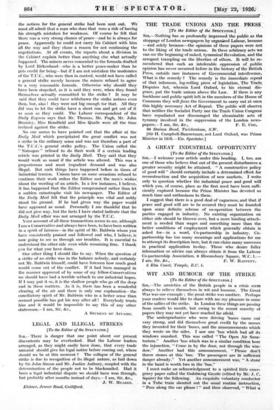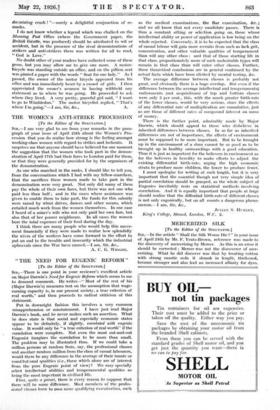WIT AND HUMOUR OF THE STRIKE
[To the Editor of the SPECTATOR.] SIR,—The anxieties of the British people in a crisis seem always to relieve themselves in wit and humour. The Great War was one example ; the great strike was another. Perhaps your readers would like to share with me my pleasure in some of the sallies of the strike. In London these things are passing from mouth to mouth, but owing to the recent scarcity of papers they may not yet have reached far afield.
The undergraduates who were driving 'buses came out very strong, and did themselves great credit by the names they invented for their 'buses, and the announcements which they wrote on the sides. I saw one 'bus which had all its windows smashed. This was called " The Open Air Sena.; torium." Another 'bus which was in a similar condition bore the injunction, " Come in by the door, not through the win- dow." Another had this announcement, " Please don't throw stones-at this 'bus. The passengers are in sufficient danger already." Yet another announcement was, " A stone in the hand is worth two in the 'bus."
I must make an acknowledgment to a spirited little emer- gency paper called the Godalming Gazette (edited by Mr. J. C. Squire) for the following. An exquisite voluntary conductor in a Tube train shouted out the usual routine instruction, " Pass along the car please ! " and then observed, What a devastating crush ! "—surely a delightful conjunction of re- marks.
I do not know whether a legend which was chalked on the Morning Post Office (where the GOvernment paper, the British Gazette, was produced) should be attributed to wit or accident, but in the presence of the rival demonstrations of strikers and anti-strikers there was written for all to read, " God is Love."
No doubt other of your readers have collected some of these gems, but you may allow me to give one more. A motor- bicycle was standing outside an office, and on the pillion seat was pinned a paper with the words " Seat for one lady." As I passed, the owner of the motor bicycle appeared from his office and was immediately beset by a crowd of girls. I then appreciated the owner's acumen in having withheld any statement as to where he was going. He proceeded to ask where they lived. A very pretty, graceful girl said, " I want to go to Wimbledon." The motor bicyclist replied, " That's where I'm going."—I am, Sir, &c., A.















































 Previous page
Previous page